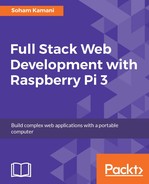In the previous chapter, we executed all our queries in a file called .sqlite.db. We will use this same file to demonstrate how to execute queries and receive their results inside our node process:
/** * Import the SQLite library, and initialize the SQLite db
instance * Mention the location of the ".sqlite.db" file that you
used in the previous chapter * We want the absolute path of the file, for better
clarity, hence, the use of path.resolve * The location inside path.resolve, is the location of the
sqlite.db file relative to this one */ const sqlite3 = require('sqlite3') const path = require('path') const db = new
sqlite3.Database(path.resolve('./.sqlite.db')) /** * The "serialize" method of the db instance makes sure
that all queries directly in its callback are executed
sequentially */ db.serialize(function () { /** * db.run is used to execute write queries (UPDATE,
CREATE and DELETE). * Since this is called inside the "serialize" callback,
it will be executed in series, and a callback is not
required. */ db.run('UPDATE temperature SET value=21.3 WHERE
createdAt="2017-06-24 10:27:25"') /** * The "all" method of the db instance means that we want
to return all results matching the given query, and returns
it in the "results" argument in the callback function */ db.all('SELECT * FROM temperature', (err, results) => { if (err) { console.error(err) } console.log(results) }) }) /** * At this point, we are done with the database. Close the
connection after the queries execute */ db.close()
In the preceding code snippet, you learned how to run both read and write queries on our database. Next, let's make a module that specializes in running the database operations for us.
